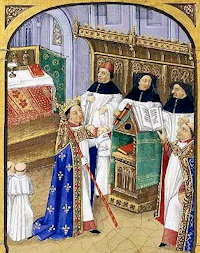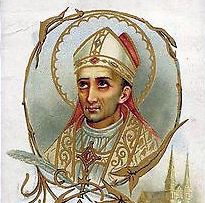Easter: April 10th
Wednesday of the Second Week of Easter
Other Commemorations: St. Fulbert, Priest (RM)
» Enjoy our Liturgical Seasons series of e-books!
The Roman Martyrology commemorates St. Fulbert (960-1029), Bishop of Chartres, France, and a poet and scholar who aided the Cluniac Reform. Born in Italy circa 952 or 960, Fulbert studied at Rheims, France, under future Pope Sylvester II. In 1003 he returned to France, becoming the bishop of Chartres in 1007. Fulbert rebuilt the cathedral there when it burned down and defended monasticism and orthodoxy. His hymns, treatises, and letter have survived.
Meditation for Wednesday of the Second Week of Easter
God so loved the world that he gave his only son, that whoever believes in him should not perish but have eternal life.
With these words of the Gospel of the Mass we are shown how the Passion and Death of Jesus Christ is the supreme manifestation of God’s love for men. He took the initiative in love, surrendering for us him whom He loves most, in whom He is well pleased—his own Son. Our faith is a revelation of his goodness, of the mercy, of the love of God for us. God is love (cf. 1 John 4:16), that is to say, love which is diffusive and is lavish: and everything is summarized in this great truth which explains everything and illuminates everything. It is necessary to see the history of Christ in this light. ‘He loved me’, writes St. Paul and each one of us can and should repeat the same to himself: ‘He loved me and sacrificed Himself for me’ (Gal 2:20). (Pope St. Paul IV, Homily on the Feast of Corpus Christi,13 Jun 1975).
The love of God for us reaches its climax in the Sacrifice of Calvary. God held back Abraham’s arm when he was on the point of sacrificing his only son, but He did not hold back the arm of any of those who were nailing His Only-Begotten Son to the Cross. Therefore St. Paul exclaims, filled with hope: He who did not spare his own Son…will he not give us all things with him? (Rom 8:32).
The self-giving of Christ constitutes a pressing call for correspondence with that love: love is repaid with love. Man was created in the image and likeness of God. And God is Love. Therefore the heart of man is made for love and the more he loves the more he becomes identified with God; only when he loves can he become happy. And God wishes us to be happy, here on earth too. Man cannot live without love.
Personal holiness is not centered in the fight against sin but in love for Christ, who shows Himself to us as being truly human, fully aware of everything about us. The love of God for men and of men for God is a love of mutual friendship. And one of the specific characteristics of friendship is relationship. In order to love Our Lord it is necessary to know Him, to speak to Him. We get to know Him by meditating on His life in the Holy Gospels. In them He shows Himself to us as being endearingly human and very close to our life. We meet Him in prayer and in the Sacraments, especially in the Blessed Eucharist.
Meditation on the Most Sacred Humanity of Our Lord—especially when we read the Gospel and when we consider the Mysteries of the Rosary—constantly nourishes our love of God and constitutes a living teaching as to how we have to sanctify our day. In his hidden life, Jesus wished to descend to the most common things of human existence, to the daily life of a manual worker to supports a family. And so we see him during almost the whole of His life working day after day, caring for his tools in the small workshop, dealing simply and in a friendly way with the neighbors who came to ask Him to make a table for them or a rafter for a new house, caring for his Mother with great affection. That is how He fulfilled the will of his Father God during those thirty years. When we look at his life, we learn to sanctify our own work, our family, our friendships. Everything that is truly human can be holy, can be a channel for our love of God, because Our Lord on assuming our human nature, sanctified it.
—Francis Fernandez, In Conversation with God, Daily Meditations Volume Two: Lent-Holy Week-Eastertide
St. Fulbert
 Bishop, b. between 952 and 962; d. 10 April, 1028 or 1029. Mabillon and others think that he was born in Italy, probably at Rome; but Pfister, his latest biographer, designates as his birthplace the Diocese of Laudun in the present department of Gard in France. He was of humble parentage and received his education at the school of Reims, where he had as teacher the famous Gerbert who in 999 ascended the papal throne as Sylvester II. In 990 Fulbert opened a school at Chartres which soon became the most famous seat of learning in France and drew scholars not only from the remotest parts of France, but also from Italy, Germany, and England. Fulbert was also chancellor of the church of Chartres and treasurer of St. Hilary's at Poitiers. So highly was he esteemed as a teacher that his pupils were wont to style him "venerable Socrates". He was a strong opponent of the rationalistic tendencies which had infected some dialecticians of his times, and often warned his pupils against such as extol their dialectics above the teachings of the Church and the testimony of the Bible. Still it was one of Fulbert's pupils, Berengarius of Tours, who went farthest in subjecting faith to reason. In 1007 Fulbert succeeded the deceased Rudolph as Bishop of Chartres and was consecrated by his metropolitan, Archbishop Leutheric of Sens. He owed the episcopal dignity chiefly to the influence of King Robert of France, who had been his fellow student at Reims. As bishop he continued to teach in his school and also retained the treasurership of St. Hilary. When, about 1020, the cathedral of Chartres burned down, Fulbert at once began to rebuild it in greater splendour. In this undertaking he was financially assisted by King Canute of England, Duke William of Aquitaine, and other European sovereigns. Though Fulbert was neither abbot nor monk, as has been wrongly asserted by some historians, still he stood in friendly relation with Odilo of Cluny, Richard of St. Vannes, Abbo of Fleury, and other monastic celebrities of his times. He advocated a reform of the clergy, severely rebuked those bishops who spent much of their time in warlike expeditions, and inveighed against the practice of granting ecclesiastical benefices to laymen.
Bishop, b. between 952 and 962; d. 10 April, 1028 or 1029. Mabillon and others think that he was born in Italy, probably at Rome; but Pfister, his latest biographer, designates as his birthplace the Diocese of Laudun in the present department of Gard in France. He was of humble parentage and received his education at the school of Reims, where he had as teacher the famous Gerbert who in 999 ascended the papal throne as Sylvester II. In 990 Fulbert opened a school at Chartres which soon became the most famous seat of learning in France and drew scholars not only from the remotest parts of France, but also from Italy, Germany, and England. Fulbert was also chancellor of the church of Chartres and treasurer of St. Hilary's at Poitiers. So highly was he esteemed as a teacher that his pupils were wont to style him "venerable Socrates". He was a strong opponent of the rationalistic tendencies which had infected some dialecticians of his times, and often warned his pupils against such as extol their dialectics above the teachings of the Church and the testimony of the Bible. Still it was one of Fulbert's pupils, Berengarius of Tours, who went farthest in subjecting faith to reason. In 1007 Fulbert succeeded the deceased Rudolph as Bishop of Chartres and was consecrated by his metropolitan, Archbishop Leutheric of Sens. He owed the episcopal dignity chiefly to the influence of King Robert of France, who had been his fellow student at Reims. As bishop he continued to teach in his school and also retained the treasurership of St. Hilary. When, about 1020, the cathedral of Chartres burned down, Fulbert at once began to rebuild it in greater splendour. In this undertaking he was financially assisted by King Canute of England, Duke William of Aquitaine, and other European sovereigns. Though Fulbert was neither abbot nor monk, as has been wrongly asserted by some historians, still he stood in friendly relation with Odilo of Cluny, Richard of St. Vannes, Abbo of Fleury, and other monastic celebrities of his times. He advocated a reform of the clergy, severely rebuked those bishops who spent much of their time in warlike expeditions, and inveighed against the practice of granting ecclesiastical benefices to laymen.
Fulbert's literary productions include 140 epistles, 2 treatises, 27 hymns, and parts of the ecclesiastical Office. His epistles are of great historical value, especially on account of the light they throw on the liturgy and discipline of the Church in the eleventh century. His two treatises are in the form of homilies. The first has as its subject: Misit Herodes rex manus, ut affligeret quosdam de ecclesia, etc. (Acts 12:50); the second is entitled "Tractatus contra Judaeos" and proves that the prophecy of Jacob, "Non auferetur sceptrumde Juda", etc. (Genesis 49:10), had been fulfilled in Christ. Five of his nine extant sermons are on the blessed Virgin Mary towards whom he had a great devotion. The life of St. Aubert, bishop of Cambrai (d. 667), which is sometimes ascribed to Fulbert, was probably not written by him. Fulbert's epistles were first edited by Papire le Masson (Paris, 1585). His complete works were edited by Charles de Villiers (Paris, 1608), then inserted in "Bibl. magna Patrum" (Cologne, 1618) XI, in "Bibl. maxima Patri." (Lyons, 1677), XVIII, and with additions, in Migne, P.L., CXLI, 189-368.
—Excerpted from The Catholic Encyclopedia
Patronage: Chartres, France
Symbols and Representation: preaching monk; in his sick bed with the Virgin Mary nearby
Highlights and Things to Do:
- Find out more about St. Fulbert:






